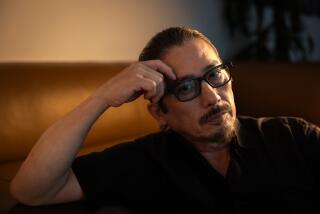Bucking Tradition Sparks No-Confidence Vote
- Share via
TOKYO — Self-proclaimed reformer and prize-winning author Yasuo Tanaka became only the second Japanese governor since World War II to suffer a no-confidence vote Friday after local assembly members censured him by a 9-to-1 margin.
The measure, which passed 44-5, could lead to Tanaka’s ouster or snap elections for a new assembly.
Some saw Friday’s dramatic confrontation, carried live by the major television networks, as a last stand by a principled governor against pork-barrel projects. Others said it was a vote by the Nagano prefectural assembly against one individual’s dictatorial and unreasonable management style.
Either way, the battle underscores the difficulties faced by any politician trying to do things differently in a nation where tradition is revered and the social and economic problems are protracted.
Tanaka, elected 21 months ago as an independent, made waves in the conservative district from his first day on the job with his flamboyant, unconventional style and reputation for womanizing. He also ruffled feathers with his opposition to dams and other public works projects, in a nation where construction has long been king.
“Nagano Gov. Yasuo Tanaka is fast learning that when it comes to dams, you’re damned if you do and damned if you don’t,” the Mainichi newspaper wrote soon after his election.
Tanaka, who at 46 is Japan’s youngest governor, had a glass office built so voters and bureaucrats could watch what he was doing. He once told government employees who didn’t agree with his policies to “go someplace like North Korea.” And he’s rarely seen without a softball-sized lapel pin in the shape of an antelope on his flashy suits--in a country where most politicians are derided for looking like dobu nezumi, or drain rats.
Tanaka wore a polka dot tie and a brave face at Friday’s showdown, triggered when he threatened to cancel the Asakawa and Shimosuwa dams approved by the assembly years ago. A parade of aged assemblymen filed past him and hardly glanced in his direction as they cast their ballots to vote him from office.
The no-confidence measure accused him of being self-righteous and childish, among other things. Most of those who voted in favor were members of the ruling Liberal Democratic Party, with only Communist Party members voting against it.
“I’d like to listen to the opinion of many Nagano citizens before making a decision on what to do next,” Tanaka told reporters shortly after the early evening vote.
Under local rules, he can resign; dissolve the assembly within 10 days, leading to a snap election; or do nothing and find himself out of office within 10 days.
Voters elected him in October 2000 by a huge margin for his outsider stance and opposition to public works projects. Anti-reform assembly members who took him on during the early days received hate e-mail from voters calling them a “bunch of gangsters” and advising them to “quit now.”
Polls still give him roughly a 50% support rate, but it’s less clear whether the public will stand strongly behind him in any new electoral showdown.
“I supported him initially, but as I’ve seen more of him I’ve become more anxious,” said Kiyoshi Minamiyama, 49, a restaurateur in Matsumoto. “There’s no clear views or policy on this dam issue. He’s too much like a showman.”
Were the electorate to return him with a strong mandate--and trounce his assembly critics--the shock waves would be felt quickly at the national level, where similar reform fights are underway.
Political analysts argue, however, that several things have changed since Tanaka’s election. Nagano voters, arguably in line with their counterparts everywhere, like the idea of reform but are less enthusiastic when it directly affects their jobs and livelihood.
The last two years have seen Nagano’s economy deteriorate further as the lift provided by the 1998 Winter Olympics evaporated, leaving the prefecture and its 2.3 million residents with few economic engines other than public works.
Tanaka has also failed to take advantage of his electoral mandate. Although he hasn’t wavered in his opposition to public works projects, critics say he has spent too much time squabbling openly with bureaucrats and lawmakers. They also blame him for not working the system or even making a convincing public case for Japan and Nagano’s need to end their love affair with public works spending.
“He’s not an able politician,” said Hiroshi Takaku, an independent political analyst. “He’s just a great communicator.”
That said, many remain sympathetic to his message. There’s a growing acknowledgment even among the most die-hard rural voters that the traditional pave-and-pave bias is wasteful, environmentally destructive and ineffective.
“Japanese people want a change,” said Harumi Arima, an independent political analyst.
Public works projects no longer provide the economic stimulus they once did, at a time when local debt levels are so high that prefectures can’t even afford to pay their 30% share of the burden for central government projects.
“Japan doesn’t need any more dams, nor does Nagano,” said Reiko Amano, head of the Coalition to Halt Public Works Projects, a nonprofit group. “Nagano, the mountainous backbone of Japan, is particularly unsuited because it’s on active fault lines that make dams dangerous and susceptible to floods and landslides.”
Her group says there are now 2,700 dams across Japan, a nation about the size of California, with 100 more under consideration.
*
Rie Sasaki in The Times’ Tokyo Bureau contributed to this report.
More to Read
Sign up for Essential California
The most important California stories and recommendations in your inbox every morning.
You may occasionally receive promotional content from the Los Angeles Times.













